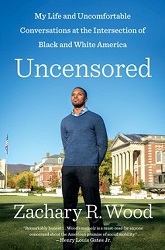What We're Reading Now
Sensitivity and Censorship
20 November 2018
Eden read Uncensored: My Life and Uncomfortable Conversations at the Intersection of Black and White America by Zachary Wood and examined what makes her uncomfortable about controversial topics.
Tags: communication, conflict, diversity, eden read, the next big idea club
Zachary Wood has a very high tolerance for controversy. I’m not talking about the kinds of hot takes that my friends like to bring up over dinner, like, “What do you think about pineapple on pizza?” or even, “Is a hotdog a sandwich?” Rather, think about the emotional space you occupy when someone confidently voices a political, spiritual, intellectual, or interpersonal opinion with which you passionately disagree. My preference is to avoid engaging in conversations filled with this kind of contention; Wood embraces them.
The title of Wood’s memoir, Uncensored: My Life and Uncomfortable Conversations at the Intersection of Black and White America, led me to believe that his book would focus on something like bias, race relations, or criminal justice reform. However, I learned that the title speaks specifically to two topics. First, “uncensored” refers to the openness with which Wood discusses his childhood conditions of abuse and poverty. In fact, most of Uncensored is a narrative of Wood’s childhood. These chapters recount many conversations between Wood and his mother and I found them both easy and horrible to read. Second, “uncensored” refers to Wood’s involvement in the organization Uncomfortable Learning during his time at Williams College. He gained notoriety as president of the organization for inviting speakers to campus whose opinions ranged from politically incorrect to downright offensive. The backlash he experienced sparked a national debate about free speech on college campuses. I believe that this idea of uncensored is where Wood would like the reader to focus.

The concept of Uncomfortable Learning is fairly straightforward—invite controversial speakers to campus and have students engage them in civil debate. Wood believes it’s important for us as a society not to lose the ability to face controversy head-on. I agree with him that being sensitive to particular subjects can inhibit productive discussions and learning. In fact, last week I found myself in a the middle of a conversation (ironically about sensitivity to controversy) that I didn’t want to be having. Something that I meant as a passing and inconclusive comment somehow sparked a broad and philosophical argument about free speech that exhausted me emotionally. I wish I could say that I immediately processed the conversation the way I know it was intended, as a lighthearted debate, and asked to start over, take a break, or let the other person know that this wasn’t the conversation that I wanted to have. Unfortunately, when it comes to smoothly articulating complex thoughts and feelings in the moment, I’m not (quite) there yet.
I’ve lived much of my life training others not to engage me on controversial topics. But I’ve recently come to terms with the fact that some things are too important not to discuss. So, after an hour break and some plant shopping, I reengaged in the conversation. I said, “My anger is coming from a place of insecurity, not hate. I want to learn more about your perspective and why you think your opinion about this is true. Could you send me a few of the articles that you’ve read on this topic?” Thankfully, I had a gracious conversation partner who responded well to my opening statement and was willing to give our conversation a second go.
I agree with Wood that it’s hard and important work to practice holding two opposing viewpoints in front of you at the same time. However, I don’t think that the learning Wood wanted to foster could only have been accomplished by engaging the most fringe speakers and thought leaders he could imagine. It led me to this question: in a world where information is largely filtered through soundbites and headlines, what is the unique value of giving a platform to individuals whose opinions we know are harmful out of context (or worse—hateful within context)? It will probably take many more difficult conversations for me to come to a conclusion. But for now I am working—in less extreme ways—to be more uncomfortable in my learning.







Comments
Our Comment Policy:
Our blog posts are only half of the conversation. What our readers have to say is equally important to us, and we're grateful for all the comments that continue the dialog.
To ensure that the discussion here is as useful as possible to all of our readers, please be respectful of our contributors and refrain from harassing, threatening and/or vulgar language. We reserve the right to screen and remove any comments from the site. If you have a question about a comment or want to discuss our policy, please contact us. We'll talk it over.
There are no comments for this entry yet.